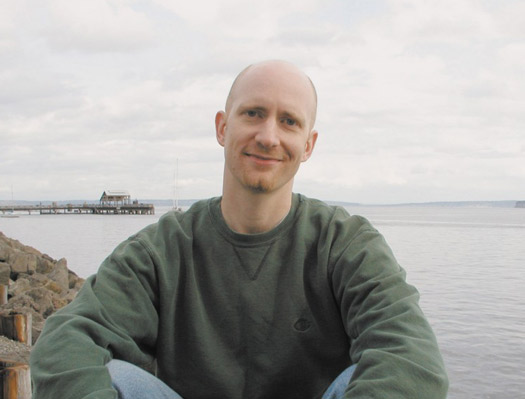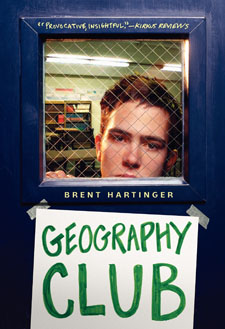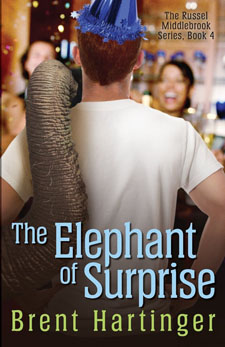Interview with Brent Hartinger
 Brent Hartinger’s first novel, Geography Club, told the story of teen Russel Middlebrook, who forms a gay-straight alliance at his high school — except the club’s name, in order to avoid drawing undue attention, is the Geography Club.
Geography Club was a Lambda Literary Award Finalist, an ALA Popular Paperback, and a Booklist Top Ten Best First YA Novel among many other accolades, and it was recently adapted into a feature film that will be released November 15.
Brent Hartinger’s first novel, Geography Club, told the story of teen Russel Middlebrook, who forms a gay-straight alliance at his high school — except the club’s name, in order to avoid drawing undue attention, is the Geography Club.
Geography Club was a Lambda Literary Award Finalist, an ALA Popular Paperback, and a Booklist Top Ten Best First YA Novel among many other accolades, and it was recently adapted into a feature film that will be released November 15.
Since writing Geography Club, Brent went on to write three sequels in the Russel Middlebrook series including most recently The Elephant of Surprise, as well as several other YA books. He’s also a screenwriter and former entertainment reporter at AfterElton, which was AfterEllen’s brother site focusing on gay and bisexual men in entertainment. That’s where I first met Brent, and recently I invited him to answer some questions about his writing career, the Geography Club movie, and what’s next for him.

Malinda Lo: Geography Club came out ten years ago in 2003. It was among the first of a wave of LGBT YA novels by authors including yourself, Julie Anne Peters, Alex Sanchez, and David Levithan. How do you feel LGBT YA has changed over the past decade?
 Brent Hartinger: Oh, the diversity and the quality is fantastic! Of course, I have my wishlist of things I want to see more of—more bisexuals, less middle class white boys, more genre stuff.
Brent Hartinger: Oh, the diversity and the quality is fantastic! Of course, I have my wishlist of things I want to see more of—more bisexuals, less middle class white boys, more genre stuff.
And I do worry that we’ve gone from being “controversial” in YA publishing to being “niche,” which is a different problem, but still a problem. It’s all so new that I think publishers put these books in certain boxes—they have certain expectations. But of course those boxes become self-fulfilling prophecies. But lately it seems like even some of the intended-to-be-really-mainstream titles have secondary LGBT characters, which is great. Someday very soon they’ll be the lead, I hope.
Maybe I shouldn’t say this, but you know how I know we’ve really “made it”? I now sometimes read LGBT YA titles that I hate. Which just goes to show (a) publishers are now so unafraid of LGBT stuff that they sometimes even publish crap (!!), and/or (b) there is so much diversity in the industry that there is room for sensibilities and writing styles that I just can’t relate to in any way.
Either way, it’s a really good thing!
 ML: You recently released the fourth book in the Russel Middlebrook series, The Elephant of Surprise, but this time you decided to publish it on your own. Why did you choose this route?
ML: You recently released the fourth book in the Russel Middlebrook series, The Elephant of Surprise, but this time you decided to publish it on your own. Why did you choose this route?
BH: Well, it’s a bit of a story.
HarperCollins published the first three books in the series, but honestly, they weren’t a good publisher for me. I had a constantly changing series of editors – six in all, I think. I liked some of them a lot, but some made decisions that just seemed insane to me, like taking the second book in the series out of print the month after the third book was released (while I was supposed to be writing the fourth book!).
Anyway, I left HarperCollins around 2008. But that was right about when e-publishing hit, and I was getting all these emails from people who wanted to read my books, most of which were out-of-print. I begged Harper to put out e-editions, but they just had no interest at all.
So VERY reluctantly, I had my agent petition for the rights back on all my out-of-print books, and I put out my own e-editions, and eventually paperback editions too. I didn’t get rich, but they sold better than I expected.
Then the movie version of Geography Club was finally announced, and I thought, “Well, why not finish the fourth book that I’d started once before?” Since HarperCollins had kept Geography Club in print, I knew no publisher would be interested, so I decided to self-publish that too.
I can’t retire yet, but all the books together at least pay my mortgage every month. And I don’t have a small mortgage!
ML: How does self-publishing compare to traditional publishing for you?
BH: From the start, my plan was to duplicate traditional publishing as closely as possible. So I hired my first editor from HarperCollins, my first proof-reader, and so on. It was a lot of work for me too—like, twice as much work as I’d ever done with a traditional title.
But in a way, it was sort of cool. I learned all these skills I didn’t have before. And like I said, past publishers had made marketing decisions that didn’t make any sense to me, so I like being in control. There’s really nothing quite as frustrating as a publisher picking a book jacket or a title you hate, and then the book disappoints, and you wonder, “What would’ve happened if they’d listened to me?”
And, of course, when you do succeed on your own, it’s very, very satisfying.
The things that have surprised me? It’s almost impossible to get any mainstream media attention for a self-published book. Most of the traditional review outlets ignored me, which was a bit of shock, frankly. I mean, most had given me great reviews in the past, and, hey, it’s a sequel to a book that’s been turned into a feature film. I figured I’d be an exception. But I wasn’t.
Also, my traditionally books had always sold really well to libraries. This time around, that’s been negligible. That has to do with the review outlets ignoring me, I’m sure, but it was another shock.
So I had to get creative. I was lucky because I have an existing fan base, and also because I’ve had the publicity around the Geography Club movie. But I think/hope I’ll eventually make more money than I did with any of the Harper books, except for Geography Club. Fewer copies, but more money.
Bottom line, though, The Elephant of Surprise was a very unique book with a pretty big platform. If I can’t duplicate that again, I’m not sure I’ll self-publish.
ML: Geography Club was recently made into a feature film that won the Audience Prize for Best Dramatic Feature at Outfest — congratulations! How involved were you in the filmmaking process? What was it like to see your book on the big screen?
BH: Oh, Malinda, it’s just off-the-charts surreal. I was on the set for three days, one of which was a football stadium scene. They had a thousand extras in the stands, two whole football teams, a marching band, cheerleaders. I’m watching all this and thinking, “All this for my dumb little book?” I felt like Pharaoh watching them build a pyramid in my honor.
Over the years, I’ve gotten to know the producers, the writer, the director, and a lot of the actors, and I feel like I’ve made some really good friends. They were so respectful, so thoughtful. But apart from offering my opinion here and there, I wasn’t involved in the creative side of things. At first I was disappointed, but in retrospect, I’m kind of glad. This way, I got to witness the whole process, and I get all this credit if the movie turns out well, and none of the blame if things go wrong.
And it DID turn out well—it’s a really good film, just top-notch all the way, and audiences seem to really love it. I’d be a fool to resent that kind of success.
It helps that I’ve been working on my own screen projects. Some other producers and I are in very active pre-production on one in particular – that’s been fascinating too. And the success of Geography Club the movie, and everything I learned, has only helped with that.
I like writing novels, but my passion has always been my screenwriting. I lived in Los Angeles for a while, I won some screenwriting awards, and I came very close to having a couple of my scripts produced back in the 90s, but it always seemed to fall through. I turned to novels only because my screenwriting career was in the toilet.
So it’s interesting to me that novels eventually led me back to screenwriting.
ML: What’s next for you as a writer? Will you be doing both traditional and self-publishing?
BH: I’ve got a whole bunch of projects I’ve been working on. I split my time about 50/50 between screenplay and novel projects—mostly non-YA novels these days, thrillers and fantasy and sci-fi.
Hopefully, most of these novels will be traditionally published—my agent is circulating two of them now. But I suppose in certain circumstances I could self-publish again.
The weird thing is—and maybe I shouldn’t admit this either—I feel like I’m only just now finally starting to understand this whole writing thing, how to write well, and also how the crazy business of marketing and publishing works. But I guess that’s okay because I feel like I still have a lot of years left in me.
>>>
Brent Hartinger is the author of many award-winning screenplays, plays, and novels. Geography Club, the first book in his Lambda Award-winning Russel Middlebrook Series, is now a feature film co-starring Scott Bakula and Ana Gasteyer. The Elephant of Surprise, his latest book, is available now. Visit Brent Hartinger’s website or follow him on Twitter.
<<<
Want to win a copy of The Elephant of Surprise by Brent Hartinger? Check out the Giant YA Pride 2013 Giveaway!